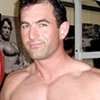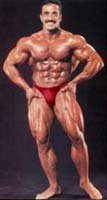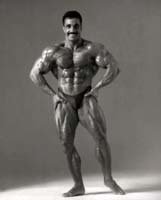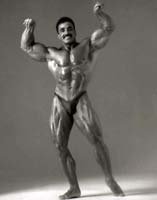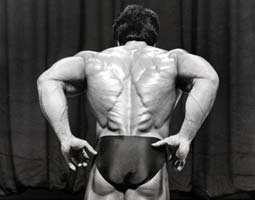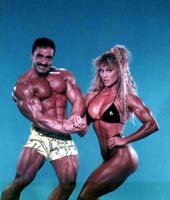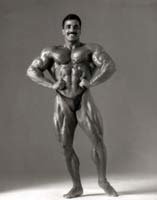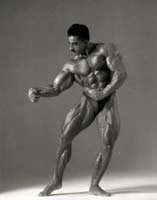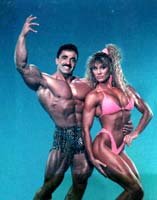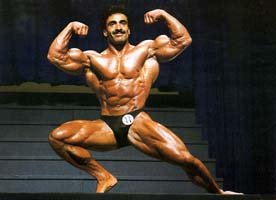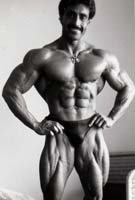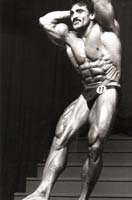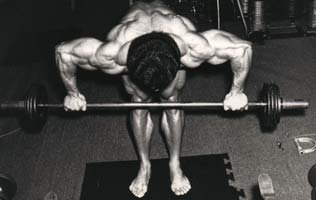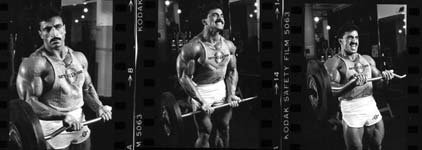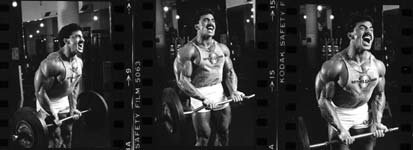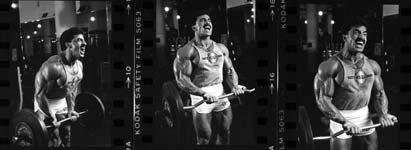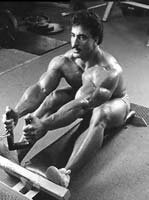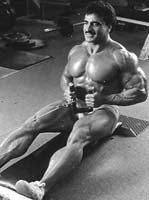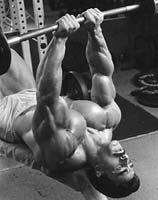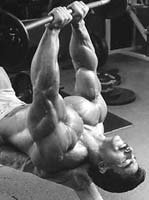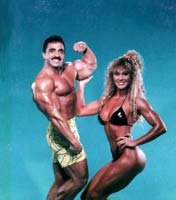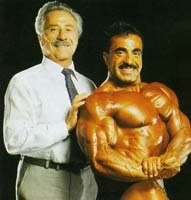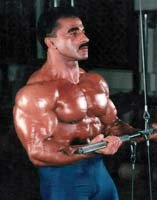| Part 1 | Part 2 |
Owner of one of the most impressively balanced and aesthetically pleasing physiques in bodybuilding history is Beirut, Lebanon native, Samir Bannout, who after first arriving in the U.S in 1974 has become one of the iron games most enduring and endearing champions.
Competitive success began for Samir, 51, when he won the 1974 Teenage Mr. Universe at age 18 in Lebanon. Always one for aiming high, Samir then set his sights on a bodybuilding career in the country he felt was the most advanced in the world: the U.S.A.
Upon arriving in America he made Detroit his home and got to work adding quality size to his well-proportioned physique; four years later, in 1978, he won Mr. Michigan and a year later, The Best in the World and World Amateur Championships Light Heavyweight titles, the latter earning him his pro card and a chance to compete amongst the sport's best.
Between 1980 and 1983, Samir competed in 10 pro shows, not quite living up to his potential in each (he was regularly told he had the ability to go all the way, but constantly battled water retention problems). In 1983 that would all change as he finally pulled it all together to take, in spectacular fashion, the sports biggest title, Mr. Olympia.
With a complete package of dryness, cuts, proportion, muscularity and lower back density not previously seen together he defeated top champions of the day including Frank Zane, Mohamed El Makkaway and Lee Haney to become the seventh man to win this prestigious award.
Other major wins for Samir include WABBA World Championship titles in 1985 and 1986 and the Pittsburgh Pro Invitational trophy in 1990. As one of bodybuilding's most persistent athletes, Samir has earned his success the hard way: his 17-year pro career has spanned 53 contests and his attempts to wrest the Olympia crown number 11, a record among the titles winners.
His last competition was the 1996 Masters Mr. Olympia where he placed sixth - not his finest hour by his own admission. History will tell us, though, that to write Samir Bannout off would be foolish, and truer words have never been spoken: today Samir is again in great shape and ready to show the world just what can be achieved when you train with passion and heart (this writer has seen Samir's recent physical development and, take my word for it, he will surprise many). The Lion will roar again it seems.
Another title Samir could lay claim to is that of bodybuilding's most controversial athlete. Although today he insists his life is one of peace and goodwill, over the years he has been variously described as overly emotional, sensitive, volatile, fiery, and explosive egoistic, macho and proud, but he is also considered charming, funny, entertaining and direct.
Many have found him opinionated and intimidating. Whatever the case, the Samir I spoke to was warm, charming and sensitive, a man who places his family and friends above all else. The matter remains open to debate.
One thing is for sure though: conversing with the Lion of Lebanon is never dull. In the following interview (the first of two parts) Samir discusses what is new in his life, recounts his bodybuilding experiences and provides valuable insights into training and nutrition.

[ Q ] What kind of shape are you in right now Samir?
Well believe it or not, right now I am in decent shape. All of a sudden it clicked for me that here I was walking around weighing like 232 pounds. I thought, "Why don't I just go down to about 210?" So I am already 75 percent there. I have a lot of striations, a lot of quality - it is all coming together.

[ Q ] What is your motivation for getting into top shape?
I have invented this machine called the Body Blaster, a very nice portable piece of equipment that you can train your entire body on. It is a small machine that you can train very intensely on. Even Ronnie Coleman could use it effectively and you can train everything with it.
It is the size of a laptop. I have been working on it for years and it is ready after six prototypes. We will manufacture it soon and do an infomercial to sell it all over the world. We will sell it on TV and through advertisements in all the muscle magazines. And this is the main reason I am getting into top shape right now.

[ Q ] Bodybuilding fans have not heard a lot from you in recent years. You did however guest-pose at the 2006 San Francisco Pro, a showing that did not get the best of reviews. Tell me more about this. 
A couple of years ago I decided to compete in San Francisco but I got sick. What I did not realise was that I had a major root canal problem which infected my upper jaw - I didn't even notice it. I didn't even feel it. So I was training with a severe infection.
It was so bad the doctor told me I could have died from it. This all happened one-month before the San Francisco Pro. I was doing amazing, was in incredible shape. But I don't want to brag. I'm 51 right now and shouldn't be talking too much because I will have to prove what I'm saying, but God willing I will. And once you see my new pictures you will see I am not lying.
But what happened at the San Francisco was right before the show - I went to the gym and struggled to do 225 pounds on the bench press. Normally that weight is a warm-up for me. But I couldn't do it. What was happening?
I tried to squat and my knees were hurting. I was weak! All of a sudden, I'm talking to this dentist. I told him I had a root canal in Lebanon about the year before. It turned out the doctor there (in Lebanon) had left a small bit of the root; he didn't remove it completely.
He didn't do it on purpose, but it did happen. And it hurt me big time. So I called the promoter and told him what the situation was and said I would do my best, take it day by day, and if I can't compete I will just come up and hang out at the show. But what he said was, "Samir, do me this big favor. You have a lot of fans. Could you guest-pose." And that was the biggest mistake.
I went on the stage and guest-posed in nowhere near the condition I should have been in - because my body wasn't responding. I was as flat as a pancake and looked terrible. I look ten times better today than I did for that show. It was like a complete shutdown of my system. And unfortunately people sometimes have no mercy. They just talk based on what they see. They couldn't see the health situation that I was in; they thought it was minor.
But I don't have anything to prove. My plan backfired. I wanted to be a nice guy and I got up onstage and they caught me with several bad pictures and these photos went all over the Internet. It was the worst I ever looked.

[ Q ] And now you are looking for some redemption?
I just wanted to come out and show people that you can look very, very good at 51. A lot like what Gary Strydom and Francis Benfatto did.

[ Q ] And Vince Taylor.
Right now I consider myself to be as good as Vince Taylor in terms of the conditioning he achieved. So I am under construction right now and today I weight in at about 219, about five pounds away from looking really shredded.

[ Q ] Training-wise, what kind of principals are you using today?
I have noticed one thing: if you want to do something, you do it from the heart. If you do it from the heart you will succeed. If you enjoy it you will succeed. If you push yourself too hard with the feeling that you have to do it, it won't work. You want to do it with joy. My current training is based on this philosophy.

[ Q ] Is this something new for you or have you always followed your heart when training?
This is something I have always done, have always trained with joy. Even if is was a merciless, torturous kind of training (laughs). I have always enjoyed training very hard. But I have noticed that as you get older the response is not as efficient and it is not as easy - not as good and the recovery is not as fast. But you have to adapt accordingly; you have to adjust. It's like they say: you put a donkey on the piano for 30 years and it should learn to play piano (laughs).

[ Q ] What is your diet like these days?
Well right now I'm on kind of a yo-yo diet. I listen to my body - sometimes I go high protein, moderate fats and low carbohydrates, sometimes I go high carbohydrates low fats. As long as you eat five proper meals per day and you recover from training, and you don't over-train, I think everything will fall into place.

[ Q ] And this is something you have always done?
Well, as we get older we gain wisdom and we learn a little bit more. But yes, I have always been consistent.

[ Q ] Being the seventh man to win the prestigious Mr. Olympia title makes you an important part of bodybuilding history. How did it feel to win this title and what did it mean to you?
It was absolutely the ultimate. As a bodybuilding competitor the Olympia is everything.

[ Q ] Throughout your career you have been plagued with water retention issues. Can you clarify once and for all why you experienced these problems? 
You know I probably did not do the right things 100 percent; I did over-train and I have a tendency to hold fluid because I am a hypertonic person (one who retains an abnormal amount of subcutaneous water) and whenever I diet very hard and push myself to the limit I have a very sensitive reaction, whether it is through the adrenal cortex or through aldosterone (a hormone secreted through the adrenal cortex that is involved in water balance).
I cannot watch my sodium too carefully because if I do, somehow my aldosterone level increases. And if I over-train that could also lead to excessive cortisol and adrenal and hormonal reactions that make the fluid go from the intercellular to the subcutaneous space.
So it was a very puzzling situation. It wasn't because I did not work hard enough. In fact, Frank Zane once told me, "Samir, you are training too hard." When I look back I think he was 100 percent right.
Other people say, "You know what, you are not dieting enough (laughs)." I will tell you, this is a very sophisticated sport. If you want to go about it scientifically you really have to know what you are doing because any hormonal changes can mess you up - even if you are doing the diet perfectly. Even if you are training super hard, if you are sleeping enough. So you have to find out all of the pieces to the puzzle.

[ Q ] Although all competitors have the potential to experience water retention on contest day, with you this was even more pronounced. Could you explain in more detail why you found it especially hard to eliminate water?
We are all similar in a way, but at the same time have different hormonal secretion processes. So you have the calmer type of person, of which I am not one. I'm more the up type of person. And sometimes being too up is not good for you either. I think it is better to be on the calm side.
For me caffeine should be a no-no. All these fat-burners of today might work well for some people, but for me it would be the opposite. And not in terms of not burning fat, in terms of giving you that depleted, watery look.
There are a lot of people out there who don't differentiate between fat and flat. If the muscle is flat and retains a lot of fluid then you will look terrible. If you are full and holding some water it is not so bad. So it is kind of confusing and only a few people in the sport can talk about it in detail. Probably one of the masters would be Frank Zane.

[ Q ] The Chemist as he was called?
Well you have to be. Not necessarily through drugs, you have to know how to react accordingly to any possibility. As far as I was concerned, in 1980, 1981 and 1982 I was training hard and dieting hard, sleeping right and doing all the right things. But in reality I was training too hard, I was watching my sodium too much. So you have to know the balance, you have to know how to respond to any situation.

[ Q ] So how were you able to pull it together for the 1983 Mr. Olympia, a show you clearly looked fantastic in?
Well I did it in a number of ways. By keeping my fluid intake up, that right there lowered my aldosterone levels. And if you keep calm after a workout, that will help the muscles to recuperate properly. For example, instead of drinking coffee, have some camomile tea to stay calm.
Relax and then you will stay calmer and then your adrenal response will come down and you will get a lot tighter. These are all things I did prior to the 1983 Olympia.

[ Q ] What else did you do before the 1983 Mr. Olympia?
I also didn't cut my sodium early. I kept it in until the last few days and I drank a lot of water prior to dropping the sodium. So I drank a lot of water before suddenly dropping the sodium and increasing the potassium. What happened was I ended up with increased intercellular fluid with a minimum level of subcutaneous fluid.
For me it was never fat-related. My problem was water-related. But then according to the doctors I actually have a very healthy body - the fact that it responded like that to water.

[ Q ] So all the media reports that you were not training and dieting hard enough were completely wrong?
They were wrong. But having said that, if I had done the right thing I could have been on the Olympia stage at 207 pounds, not 195 or 196.

[ Q ] So you could have done more in terms of what exactly?
I could have done more in terms of recuperating. Instead of trying 150 percent, I should have tried 95 percent. I worked too hard and that will cause you to lose lean tissue and when your body starts screaming, "I need to rest" and you don't listen, there will be problems.
Sometimes I won't feel like eating but the body will want the food, same thing with water. If the body is lacking certain minerals like potassium, this could be all that is wrong. And it takes a lot for someone to learn all these little details.
That is me though (the examples given). Not everybody would react the same way. Some people could train harder and diet harder and not get those problems. But it affected me.

[ Q ] Although you did compete at less than 200 pounds your look was a desirable one for that era. It was perfectly balanced and had good, though not excessive size. You carried more mass than both Chris Dickerson and Frank Zane, men who has previously won the Olympia title. So despite your saying you could have been larger you did have the perfect look on the day.
Not to sound cocky but I would have to agree with you. I think I had enough muscle density to win, enough balance. But, however, I really thought I could have been slightly heavier and even harder. You see in 1982 I was 186 pounds. Very hard, but if you look at the pictures closely I looked like a tennis played in my clothes. I'm serious.
I think quality over quantity for sure, but if you have the quantity, why sacrifice it? So I did lose quite a bit of muscle. I did have a pretty physique though.
Right now I still think I have that pretty physique and feel I could land at 210 looking really, really hard. And I could possibly go down to 190, but this would have to be done over a long period. You have to go down very slow. If you force the body to do something fast the body will react the opposite way. You can't force the body; you have to allow it time to heal.

[ Q ] Your overall physique at the 1983 Mr. Olympia was in peak condition and awarded accordingly. But your back development was particularly strong. What did you do to achieve such size and shape in this area?
The back is my favorite body part to train. Basically I do a lot of chin-ups and bent-over-rows. Right at the beginning of my career I was an Olympic lifter and this helped me a great deal with my lumbar region. So I did have a better lower back compared to a lot of people and that is probably related to my time as an Olympic lifter. The clean-and-jerk and just pulling exercises in general are the ones I like. Chin-ups and bent-over-rows are the main recipe I think.

[ Q ] What do you emphasise with these movements: technique or weight?
I go by feeling. And normally I feel very strong with these exercises and use heavy weights. Even today I still use 315 pounds for the bent-over-row. And for guys like me that is considered quite a bit.

[ Q ] Do you use straps for with this weight? What is your technique like?
No straps. And I do it on a small easy-curl bar. I put it on a low rack and take a tight grip. The circumference of the bar is not very wide so the grip is no problem at all. The 315 pounds is no problem for me.

[ Q ] That is pretty good.
Yes, that is not a problem at all. I love back exercises but unfortunately I don't do as many chin-ups as I used to. About nine years ago I had a C5 C6 bone fusion and had a little surgery that led to a problem with my brachialis on the right side. So I can do chin-ups but not as violently (laughs).

[ Q ] More controlled obviously.
Yes, more controlled and less weight. I used to do chin-ups with weights; used to hang about 35 to 50 pounds around my waist and do 25 repetitions no problem. But now I use my own bodyweight. I still feel strong in the bent-over-rows, cable pulley and one-arm-dumbbells. The emphasis is on variety.

[ Q ] What advice would you give those who want to lose body fat?
If you want to lose fat it is better that you lose it at a pound a week at the most, rather than losing two to three pounds over the same period. That is a total no-no - anytime you start using your muscle for glucose (energy) the body will respond in a negative way. Your adrenal glands will start over-working. Personally I get watery. I don't look very hard unless I take it easy. Sometimes for me, five days of rest is better than three days.

[ Q ] When you talk about rest do you mean cutting back on cardio work as well?
I would say that if you are not ready two weeks before the show, then forget about it: you will never be ready. Also you can't do too much cardio.

[ Q ] How much cardio would you do?
To be honest with you I did no aerobics for either the 1982 or 1983 Olympia's. I have to mention here that I have a very fast metabolism so for me it was a case of under-eating. For the 1980 Olympia in Australia nobody trained harder than me and nobody was in better shape than me in the gym. But you know what, I went onstage blubbery.
I stopped sodium one month before this show. I looked blubbery man! I came like 16th. It was my first Olympia. I'll be honest with you: people were saying, "Man that kid from Lebanon. He is going to kick some butt if he can put it together." And I am going 200-miles-an-hour on the autobahn while everyone else is going 55. But that was not an advantage for me. Actually it was a stupid mistake.

[ Q ] Clearly you did learn from your mistakes though.
You know what is funny. Gary Strydom once told me that when I won the Mr. Olympia I was only at 70 percent of my best. And I have to agree with him. I agree with him because when he goes onstage he does so really full and dry. Back in the 1980's there was a gentleman called Dr. Eric Sternlicht, who coached Tom Platz at the time.
Dr. Sternlicht told me the same thing. He said, "Samir, let's go high carbs. You need to eat a little more. There is no need for you to sit in the gym and train like a monster for a long time." And I came to realise that it was true. If I can fly from here to New Zealand in nine-hours why should I stay on the aeroplane for 20-hours? So I was over-training and under-eating and that is what led to my water problems.

[ Q ] People do tend to get caught up in the "more is best" mentality, right?
Yes, it's unfortunate. People think more is better. It is not so. And I am referring to everything, including what they use these days. And I was very fortunate that I never abused the real hardcore stuff. You know what I am talking about. And I am grateful and thank God for that. But I did abuse the training and did not eat enough. I never had a great appetite.
Right now I eat from the heart; I enjoy my meals. Basically I realise that I am now eating healthier. I am taking my digestive enzymes and fiber. I just had eight ounces of fish along with some spinach with some lemon and half a spoon of olive oil. And two baby potatoes. This works well for me. Every now and then I up my carbohydrates a bit and rest sometimes two days in a row as opposed to one day.

[ Q ] We have discussed your involvement in the 1980 Mr. Olympia. As we all now know Arnold's win there caused a number of competitors to boycott the 1981 version. Why did you choose not to boycott this show when many of your fellow athletes chose to make a stand?
Well maybe I should have (laughs). I just didn't want to leave the stage; I just love competition. The thing is I totally disagree with the decision in 1980, although Arnold is my hero. I thought that there was no way in hell that Arnold should have been in the top three.

[ Q ] And the 1981 Olympia, when Franco won, was possibly even more controversial.
- Don't Let A Rotator Cuff Injury Stop You! - By Shannon Clark
- Avoiding A Blowout: Rotator Cuff Exercises! - By Mike Westerdal
- The Rotator Cuff - Surgery? - By Ryan Mclane
- Other Rotator Cuff Articles...
You know I think Franco's upper body is incredible but because of the problems with his legs I thought a couple of people looked better than him. Platz (Tom Platz who placed third) looked really good. But you have to look at Franco's upper body. It looked incredible while his lower body looked bad.
Arnold's situation was different; he was flat all around and he had no injuries. Whatever he did backfired on him and he just didn't look like the Arnold I knew. In fact, and this will be news to everyone, Arnold told me at World Gym one month before that show (the 1980 Mr. Olympia) that he had a problem with his shoulders. His rotator cuff was hurting him. And he ended up taking cortisone.
Rotator Cuff:
And the cortisone caused major problems for him in terms of water retention. For some reason or another he hydrated too much. In my opinion he was flat in Australia. If you look at him there he was not that bulgy looking Arnold.
If Arnold were fuller, honestly he would have been better than all of those guys. None of these guys would beat him then. I mean when Arnold is Arnold he is Arnold. But he was not Arnold in 1980. I was not looking at Arnold. He is my hero and I just tell you the truth, my honest opinion. I think if he got third it would have been a gift. The first place was a complete robbery.

[ Q ] Were you big into steroids as a competitor?
I have to admit I was never a steroid monster. I am glad I developed a fear of steroids. Although now I realise that you can drink a glass of wine and get healthy and drink a whole bottle and experience harmful effects. It is just not the same (the effect varies depending on dosage). And that's what it is.
I should have applied this thought to my training (laughs). I'm serious. If you go to downtown LA, why not take the shortcut, why do you want to take the two-hour freeway? Life is like a school though and you live and learn. Today I am just interested in being as healthy as I can. And fortunately my look is still competitive.

[ Q ] As men age they naturally lose testosterone, which obviously is not a good thing. What can men do to restore testosterone naturally?
You can do it without anabolic steroids but you have to know how to bring your body to the point where it is secreting enough naturally. But when you reach 50 and 60 forget about it. There is no such thing. It is just not going to happen.
All men will lose testosterone - from the 30's down it will just get worse and worse. I think high intensity short duration training will help to restore testosterone naturally. Taking zinc and hCG (Human chorionic gonadotropin) can also help.
Zinc is readily available but hCG is available only by prescription as it is taken from the urine of pregnant Women. HCG causes the male testicles to produce more testosterone and has an effect on fat burning. Again you have to do things as much in moderation as possible and you have to do the natural part as much as possible.
These strategies are not there for you to count on them 100 percent. Your nutrition has to be right and you need to train properly. I think high intensity training does increase your testosterone levels. Doing long training sessions, like marathon running for example, will bring the levels down.
Writers Note: In the male, hCG injections are used to stimulate the leydig cells to synthesize testosterone. The intratesticular testosterone is necessary for spermatogenesis from the sertoli cells. Typical indications for hCG in men include hypogonadism and fertility treatment. This treatment is to be given under doctors supervision only.

[ Q ] It is thought that professional bodybuilding back in the 1970's and 1980's, was at its best from a competitive standpoint and because of the camaraderie among the athletes. Let me throw some names from this period at you and you give me your thoughts on each competitor.
Oh I love Chris. I think he is an artist and is an elegant poser. He is a master, no doubt about it. And what he did with his body is incredible. If he had been better gifted in certain areas he would have been untouchable. He did have lagging areas and we don't need to talk about them here (laughs).

[ Q ] Danny Padilla.
Danny is a freak of nature. He is balanced. And when he is on he is very hard to beat. In my opinion, after seeing him backstage in Columbus (at the 1981 Mr. Olympia) he looked totally shredded to the bone and I thought he should have done much better.

[ Q ] Tom Platz.
Tom is one of the hardest working people without a doubt, and one of the smartest and nicest people. What he did to his body I don't think anybody else could have done. Because I don't think he had a gift from God. But whatever he did he achieved astonishing results, incredible. I would have probably voted for him in 1981 (to win the Mr. Olympia).

[ Q ] You would have voted for Tom Platz over Chris Dickerson?
Oh yes. Chris looked very good when he beat me in 1982. However if he were slightly better in the mid-section and arms department he would have been very hard to beat.

[ Q ] But Tom Platz also had some deficiencies in the arms department.
He did injure his biceps and this hurt him big time. He was doing some poses where he would hide his arms. But what he did in 1981 was amazing.

[ Q ] Boyer Coe.
Another master. I loved his arms and his posing style: he posed with power. I loved the way Boyer and Chris posed: with power and style.

[ Q ] Just on your life currently, I hear you might be moving to New Zealand soon.
I do really love Mother Nature; I love peace and harmony. I love the fact that New Zealand is neutral - they don't have any enemies, no violence and this is what I am trying to escape from man. I just don't like the direction the United States is going.
These people are just getting very hostile (the government). And they are developing enemies. I think the best way to resolve problems is to sit down and talk. It does not matter, even if they are the enemy you sit down and talk. Because the other way is just a primitive mentality: just taking the guns and bombing. I love New Zealand because it is peaceful and I would like a better life for my family.

[ Q ] Well it has been a pleasure listening to your views Samir. Thank you for your time and give my regards to your family.
Thank you for the interview David. It has been my pleasure.
Be sure to check back for part two of the Samir interview Series. Included in this interview will be Samir's experiences with Arnold Schwarzenegger. It is not to be missed.
| Part 1 | Part 2 |
